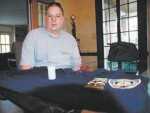Picking up the pieces

By Jason E. Silvers
Herald- Tribune
FORT SCOTT, Kan -- About six hours after the disastrous terrorist attacks that took place on American soil the morning of Sept. 11, 2001, Greg Bushman received a phone call.
He knew he would eventually receive the call, he just didn't know exactly when.
Then, it happened. The phone rang and Bushman, Fort Scott, was getting ready to put on his uniform to go to work when he picked up the phone.
He knew who it was.
The Federal Emergency Management Agency was calling him into action. At that time, Bushman was the chief of a small police force in Bronson, Kan., who had been involved with FEMA in the past. He and two other local police officers responded by traveling to New York City to perform security and patrol duties at Ground Zero after two commercial airplanes, which were hijacked by terrorists, brought the towering World Trade Center structures crashing to the ground.
"When that first plane hit the tower, I was putting on my uniform," Bushman said. "I saw the second plane hit the tower on the news. That caught my eye and I thought I'd better pay a little closer attention to this."
Other terrorist attacks on that date were targeted at the Pentagon in Washington, D.C., and a Pennsylvania field.
Bushman said he and his colleagues arrived in New York City on the morning of Sept. 12, 2001, to complete shock. Bushman said he had traveled to New York City before 9/11, but nothing could have prepared him for what he was about to see.
As they crossed the bridge into Manhattan, Bushman said they arrived in a business section of town in which everything in sight -- cars, streets, buildings -- was covered in at least a one-inch thick layer of dust and ash.
"It was like driving through snow almost," Bushman said.
Row upon row of flattened vehicles were stacked on top of each other and lining the city's side streets, Bushman said. During his previous trips to New York City, he had been amazed at the beauty of the Manhattan skyline. This time, however, was different.
"I was amazed at the change in the skyline," he said. "Every time I've gone back, it really makes an impact. (The twin towers) are just not there anymore -- that really hits home."
When Bushman and his fellow officers arrived, they were informed that there were plenty of paramedics and firefighters working at the scene in an attempt to locate survivors and clean up the wreckage, but there was a shortage of law enforcement personnel to perform security duties. And at such a traumatic time, extra officers were needed to perform security and monitor other criminal activity, he said.
"We did security at Ground Zero to keep onlookers out while they cleaned up," Bushman said. "The National Guard came in, and at the time, it was mostly state police (at the scene). Crime was actually down for them at the time. There was no down time though. They were normal crimes, just a lot more of them."
After 9/11, the typical hustle and bustle of the big city seemed to settle down, Bushman said.
"The city was a little quieter for a few days."
He was also amazed at how friendly New York citizens at the scene were to emergency response personnel working at the scene, considering the reputation of many New Yorkers as being portrayed as rude and unfriendly. Hundreds of New York residents lined the streets -- many of whom were carrying signs -- as crews worked, thanking them for their rescue efforts, he said.
Bushman and others also encountered other unplanned graciousness, as one area restaurant provided meals to all uniformed personnel during their entire stay in New York City. The hotel Bushman and the two officers stayed at also provided their room and all amenities at no cost, he said.
"It's probably because of what happened, but everyone was very friendly," Bushman said.
After he returned home, Bushman said he and other officers received award certificates with the letters "NYPD" inscribed on them to recognize those officers for their efforts and service. Bushman also returned home with several photographs of the scene and a small canister containing ash and dust from Ground Zero.
He has kept busy in the days since 9/11, including serving on a protection detail for George W. Bush when the current president visited Ground Zero a few years ago, and helping with other law enforcement duties in Kansas.
Bushman said he is also working with a unnamed federal agency on the design of a new encryption device that will improve communication between agencies during a disaster.
"One problem with 9/11 is that some (response) agencies couldn't talk to each other," Bushman said. "It's not the best communication."
This new device will use an existing military technology to translate radio traffic into information that is common for agencies to use, after which that information will be shared through computers, cellular telephones, and other digital electronic devices, Bushman said.
Bushman, who used to live and work in Chicago, said he was used the lifestyle and atmosphere of the big city.
"It's different than being in Bourbon County," he said. "It's a whole different mindset."
He's also been back to New York City since the terrorist attacks, where he viewed the numerous memorials and monuments that have been constructed since that time. And although life, for the most part, has basically returned to normal there, it is still a day in history that will never be forgotten, Bushman said.
"New York residents have a real sense now, and are cognizant of what happened on 9/11," he said.
